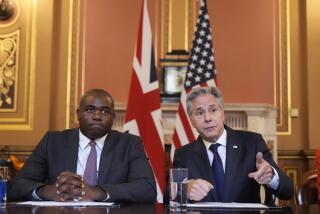U.S.-Russia dispute over Syria grows louder
- Share via
BEIRUT — The war of words between the United States and Russia over Syria escalated Thursday as Secretary of State Hillary Rodham Clinton accused Moscow of contributing to a possible “catastrophic” civil war in Syria and the U.S. envoy to the United Nations called reported Russian arms deliveries to Syria “reprehensible.”
The Russians “keep telling me they don’t want to see a civil war, and I have been telling them their policy is going to help contribute to a civil war,” Clinton told Danish television while visiting Copenhagen.
Russia’s actions in Syria are not a “stabilizing influence,” Clinton said.
The Russians “are, in effect, propping up the regime at a time when we should be working on a political transition,” Clinton said.
At the United Nations, meanwhile, U.S. Ambassador Susan Rice described reports of Russian arms shipments to Syria as “reprehensible” after accounts surfaced that a weapons-laden Russian ship arrived in the port of Tartus last weekend.
Syria has been a divisive issue between the two powers, but the comments from the U.S. side Thursday appear to be the harshest yet directed at Moscow over its Syria policy.
There was no immediate word from Moscow on the reported arms shipment, but Russian officials have defended weapons sales as essential to Syria’s self-defense.
Russia has been the most potent international ally of Syrian President Bashar Assad, twice vetoing U.N. Security Council resolutions that could have led to sanctions or other actions against the Syrian government for its crackdown on dissent. Washington and its allies in the West and the Arab world have called for Assad to step down.
In February, Rice said she was “disgusted” by a Russian veto of a resolution condemning the Assad government.
There has been no sign of Russia changing its stance on Syria after a massacre last week of more than 100 people, mostly children and women, in the Syrian township of Houla, an event that galvanized international outrage against the Syrian government.
Although U.S. and U.N. officials have said evidence points to pro-government militiamen as the killers, Russia has responded that both government and rebel forces were probably involved.
On Thursday, Syrian authorities again denied involvement in the massacre and blamed antigovernment “armed gangs” for the killings, a finding that Rice immediately dismissed as a “blatant lie.”
According to the Syrian investigation, the killers targeted families who were pro-government, including relatives of a member of parliament.
On Sunday, Russia did sign off on a nonbinding Security Council statement condemning Syria for its use of artillery and tanks in Houla, but the move did not signal a broader shift in policy. Russia says it is not supporting Assad per se but is backing the peace plan crafted by Kofi Annan, the U.N. and Arab League special envoy for Syria.
Moscow has lashed out at other governments for favoring “regime change” and aiding militant groups fighting the Syrian government.
On Thursday, it insisted that it will not succumb to pressure on the issue.
“Russia’s position is well known, it is balanced, it is consistent and absolutely logical,” Dmitry Peskov, President Vladimir Putin’s spokesman, told the Interfax news agency Thursday. “This is why it is hardly correct to say that this position will be changing under somebody’s influence.”
Putin is expected to address the Syria issue Friday during visits to Germany and France, part of his first foreign trip since his inauguration as president May 7.
Russia’s refusal to back international action against Syria is expected to come up in Putin’s conversations with German Chancellor Angela Merkel and French President Francois Hollande.
During the campaign for his third presidential term, Putin accused Washington of aiding protests against his return to the presidency after having served four years as prime minister.
Russia says it is determined to prevent any international intervention in Syria. It views previous Western-led interventions — like those in Libya and Iraq — as having toppled Russian allies in the name of overthrowing tyrants.
Despite the differences, U.S. officials said Thursday that they would continue the effort to change Moscow’s policies.
“The Syrians are not going to listen to us,” Clinton said in Denmark. “They will listen maybe to the Russians. So we have to keep pushing them.”
In Washington, White House spokesman Jay Carney said Obama administration officials “have been working to overcome our differences with the Russians and others” on Syria.
Times staff writer Sergei L. Loiko in Moscow contributed to this report.
More to Read
Sign up for Essential California
The most important California stories and recommendations in your inbox every morning.
You may occasionally receive promotional content from the Los Angeles Times.










